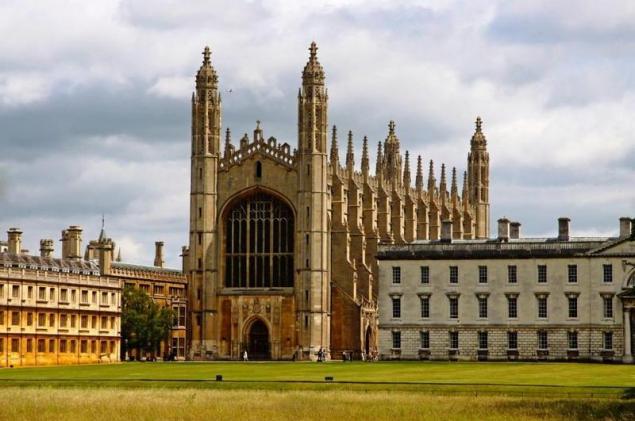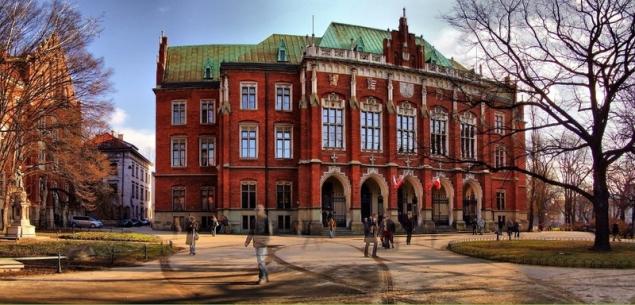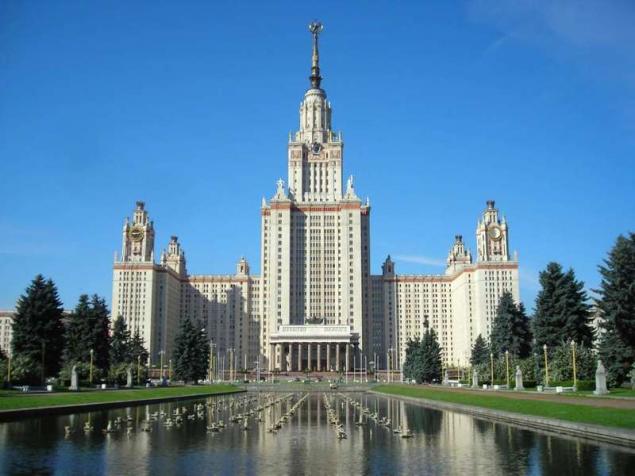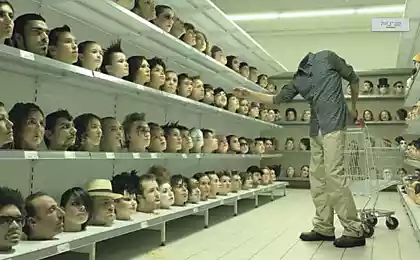623
Stefan, cap'n: Why do we need universities?
"I work in the knowledge industry and human resources. My company specializiruetsya on products of two types: we produce high quality and multi-functional units of a personnel reserve, and also commercially successful and cutting-edge new knowledge in consumer friendly packing of printed material."
This is an excerpt from the book the Cambridge historian of ideas Stefan, cap'n "Why do we need universities?",where prodiraetsya idea of the University as a Corporation.

The same can be said in another way: "I am a teacher at the University. I teach students and write books."
But this is most often the case ends.
Universities now constantly have to justify their existence. Why do you write books? And most importantly what you teach your students?By the end of the XX century, of the relatively few educational establishments for the elite University has become one of the most common public institutions.
Never before have so many people around the world are not studied in universities.
It is not surprising that many question "why?". Why do people spend several years of my life studying English literature, law, theoretical physics, the views of Hobbes to the world of medicine or folklore?
Why do we really need universities?
Influential work "the Idea of a University" George. Newman begins with the words
"University is a place of teaching universal knowledge."
It was while trying to answer this question often are born the passages about "competitiveness", "development potential", "increase economic efficiency", which resemble the above-quoted parody piece. This perception of the University, which is based on the economic category — the language of numbers, employment and income. Universities funded by the government, the government creates the budget from tax deductions.Therefore, to justify to the state and society would seem to need it.
But when we begin to speak the language of Economics, we are missing the most important thing. Perhaps strong universities do contribute to the economic well-being and prepare qualified specialists in such-and-such areas.
But to present it in the form's main purpose is to have and raise children out of a desire to give the economy a "competent workforce".
You need to start with some other places. The book, cap'n is attempting to revise the underlying assumptions for the public debate about the purpose of the University. Stay on the main arguments in more detail.
If we look at the history of the University at any stage will be faced with a contradiction: the University performs some of the original social functions, but always goes beyond them.The University prepares lawyers, some of whom start working in the field of public administration, and some are beginning to wonder about the bases of power, social structure and the nature of social action (like the origins of modern sociology).
Medieval universities were closely associated with the Church and the Christian Canon, but many of the arguments of the scholastics had much in common with the biblical text as knowledge about the structure of the fleas — aquatic science. Theoretical physics is, of course, may find some use in metallurgy, but it would be strange to force Einstein to justify "practical application" of the theory of relativity.
Therefore, the Foundation of the University is not a party, and not the audience, its purpose is not the production of "high-quality and multi-functional units of a personnel reserve".
The main feature of the University is the pursuit of a fuller understanding of any subject.
In other words, the extension and revision of the frontiers of knowledge, preserving cultural memory and its transmission to the next generations.
In this sense, universities are more like museums and art galleries than on corporations.

This analogy will bother the image-makers who seek to represent the University "the modern and dynamically developing company", as if the past is something bad, dusty and probably contagious. But in fact, in this comparison, there's nothing wrong or snobbish. Regardless of cultural memory did not exist, neither man nor society.
"The Mission of the University" Ortega y Gasset writes: "the primary and Central function of the University is teaching the main cultural important disciplines." Another mistake to identify the aim of the University to obtain skills.
Universities are taught to think critically, to think logically, to handle large amounts of information and find "creative solutions" to complex problems. And all these skills will be useful to students in their future work.
By this logic, the study of medieval history allegedly can help the future graduate to write good reports and memoranda for the sales Department.
It, cap'n rightly says:
-Why is it that the money is spent better in the case when the manufacturer understands that receiving such a graduate will help the firm to increase revenues, than when they are spent on keeping certain people better understand the history of mankind?
You can Balk at the notorious development of soft skills in the justification of the University, but it's always going to be like some kind of Dodge. It is as if we tried to improve the thesis of Montaigne "to philosophize is to learn to die", convert it to the statement "to study philosophy means to develop the transferable skills that are acquired as you progress through the training program".
On a similar but slightly more complex argument is constructed of a recent book by the philosopher Martha Nussbaum "Not for profit: Why democracy needs the Humanities". As is clear from the title, economic category Nussbaum also strongly rejects. Instead, she offers to talk about the development of human potential in all its manifestations.

In her opinion, education in the Humanities and arts (and this is the area that causes the greatest number of questions and doubts about its feasibility) develops "critical thinking skills, the ability to set aside private interests and to look at global problems from the point of view of a citizen of the world, and finally, the ability of the sympathetic to the difficulties of another person".
For all its merits, this argument still does not understand why to acquire these wonderful abilities will certainly need a few years to go to lectures, read complex texts and think, for example, about the image of the class struggle in the novels of the Victorian era. Education, of course, can develop these skills.But the connection between them does not lie on the surface.
What, then, to stop, to answer the question "why do we need universities"? Categories: economic well-being are not suitable for this because, by themselves, insufficient. According to the economist Georg von wallwitz in his book "the Invention of welfare", "those for whom welfare has become the content of life, become a very tragic figure, gradually losing its character features. They are victims of the fundamental properties of well-being: it is nothing. It leads nowhere further. It has in itself no meaning."

But it is to such tragic figures somehow often turn to public debate about the purpose of universities. This notion of the mythical "taxpayer" and "the real world", which is dedicated to the best passages of the book, cap'n.
The taxpayer usually "appears sullen and Moody creature, particularly afraid of any contact with outsiders, fearing that he had not taken away the possessions, the fruits of what it likes to call its "proceedings"".
But this strange creature immediately becomes docile and easy to part with these fruits, if you convince him that this somehow will lead to the multiplication of the total number of available belongings. More often have to deal with the idea of the so-called "real world" in which crucial importance is given to utility.
In this fictional world "live exclusively inflexible robots who devote themselves to one task — making money. They work and then you die".It's unclear where this world is. But we, fortunately, are not in this harsh reality of robots,and in a world where there is a place of human fantasy, imagination and emotions, where knowledge is valued, regardless of how much ready to pay for it on the market. At least I would hope so.
We should try to steer the conversation about the value and importance of the University with the criteria of economic utility and functionality to the language of knowledge.The University is engaged in the production of knowledge and passes it on to the next generations. It is the objective of its main components — research and teaching. It is an activity that is not subject to test by any external criteria and does not fit into the reporting table. It contains the criteria of self-assessment in myself.
At this point it is better to stop when we try to understand why we need universities. The development of useful skills and the growth of welfare can be at best a by-product of their activities. Universities have been and should remain a public good that needs to be considered in the categories of cultural memory and never-ending learning process.
Real educational institutions in which we have to visit, often do not meet these lofty definitions. But many of the reasons for this discrepancy lie in the fact that universities are subject to external criteria of evaluation, becoming a Corporation or a factory for issuing certificates. Education will not be better, if tougher requirements for universities and to increase public inspection.
This will happen only if we recognize the value of education in itself, regardless of, whether it increases the annual GDP and does that make graduates "more competitive in the labour market". Although it would be nice. published
P. S. And remember, only by changing their consumption — together we change the world! ©
Source: newtonew.com/discussions/why-universities
This is an excerpt from the book the Cambridge historian of ideas Stefan, cap'n "Why do we need universities?",where prodiraetsya idea of the University as a Corporation.

The same can be said in another way: "I am a teacher at the University. I teach students and write books."
But this is most often the case ends.
Universities now constantly have to justify their existence. Why do you write books? And most importantly what you teach your students?By the end of the XX century, of the relatively few educational establishments for the elite University has become one of the most common public institutions.
Never before have so many people around the world are not studied in universities.
It is not surprising that many question "why?". Why do people spend several years of my life studying English literature, law, theoretical physics, the views of Hobbes to the world of medicine or folklore?
Why do we really need universities?
Influential work "the Idea of a University" George. Newman begins with the words
"University is a place of teaching universal knowledge."
It was while trying to answer this question often are born the passages about "competitiveness", "development potential", "increase economic efficiency", which resemble the above-quoted parody piece. This perception of the University, which is based on the economic category — the language of numbers, employment and income. Universities funded by the government, the government creates the budget from tax deductions.Therefore, to justify to the state and society would seem to need it.
But when we begin to speak the language of Economics, we are missing the most important thing. Perhaps strong universities do contribute to the economic well-being and prepare qualified specialists in such-and-such areas.
But to present it in the form's main purpose is to have and raise children out of a desire to give the economy a "competent workforce".
You need to start with some other places. The book, cap'n is attempting to revise the underlying assumptions for the public debate about the purpose of the University. Stay on the main arguments in more detail.
If we look at the history of the University at any stage will be faced with a contradiction: the University performs some of the original social functions, but always goes beyond them.The University prepares lawyers, some of whom start working in the field of public administration, and some are beginning to wonder about the bases of power, social structure and the nature of social action (like the origins of modern sociology).
Medieval universities were closely associated with the Church and the Christian Canon, but many of the arguments of the scholastics had much in common with the biblical text as knowledge about the structure of the fleas — aquatic science. Theoretical physics is, of course, may find some use in metallurgy, but it would be strange to force Einstein to justify "practical application" of the theory of relativity.
Therefore, the Foundation of the University is not a party, and not the audience, its purpose is not the production of "high-quality and multi-functional units of a personnel reserve".
The main feature of the University is the pursuit of a fuller understanding of any subject.
In other words, the extension and revision of the frontiers of knowledge, preserving cultural memory and its transmission to the next generations.
In this sense, universities are more like museums and art galleries than on corporations.

This analogy will bother the image-makers who seek to represent the University "the modern and dynamically developing company", as if the past is something bad, dusty and probably contagious. But in fact, in this comparison, there's nothing wrong or snobbish. Regardless of cultural memory did not exist, neither man nor society.
"The Mission of the University" Ortega y Gasset writes: "the primary and Central function of the University is teaching the main cultural important disciplines." Another mistake to identify the aim of the University to obtain skills.
Universities are taught to think critically, to think logically, to handle large amounts of information and find "creative solutions" to complex problems. And all these skills will be useful to students in their future work.
By this logic, the study of medieval history allegedly can help the future graduate to write good reports and memoranda for the sales Department.
It, cap'n rightly says:
-Why is it that the money is spent better in the case when the manufacturer understands that receiving such a graduate will help the firm to increase revenues, than when they are spent on keeping certain people better understand the history of mankind?
You can Balk at the notorious development of soft skills in the justification of the University, but it's always going to be like some kind of Dodge. It is as if we tried to improve the thesis of Montaigne "to philosophize is to learn to die", convert it to the statement "to study philosophy means to develop the transferable skills that are acquired as you progress through the training program".
On a similar but slightly more complex argument is constructed of a recent book by the philosopher Martha Nussbaum "Not for profit: Why democracy needs the Humanities". As is clear from the title, economic category Nussbaum also strongly rejects. Instead, she offers to talk about the development of human potential in all its manifestations.

In her opinion, education in the Humanities and arts (and this is the area that causes the greatest number of questions and doubts about its feasibility) develops "critical thinking skills, the ability to set aside private interests and to look at global problems from the point of view of a citizen of the world, and finally, the ability of the sympathetic to the difficulties of another person".
For all its merits, this argument still does not understand why to acquire these wonderful abilities will certainly need a few years to go to lectures, read complex texts and think, for example, about the image of the class struggle in the novels of the Victorian era. Education, of course, can develop these skills.But the connection between them does not lie on the surface.
What, then, to stop, to answer the question "why do we need universities"? Categories: economic well-being are not suitable for this because, by themselves, insufficient. According to the economist Georg von wallwitz in his book "the Invention of welfare", "those for whom welfare has become the content of life, become a very tragic figure, gradually losing its character features. They are victims of the fundamental properties of well-being: it is nothing. It leads nowhere further. It has in itself no meaning."

But it is to such tragic figures somehow often turn to public debate about the purpose of universities. This notion of the mythical "taxpayer" and "the real world", which is dedicated to the best passages of the book, cap'n.
The taxpayer usually "appears sullen and Moody creature, particularly afraid of any contact with outsiders, fearing that he had not taken away the possessions, the fruits of what it likes to call its "proceedings"".
But this strange creature immediately becomes docile and easy to part with these fruits, if you convince him that this somehow will lead to the multiplication of the total number of available belongings. More often have to deal with the idea of the so-called "real world" in which crucial importance is given to utility.
In this fictional world "live exclusively inflexible robots who devote themselves to one task — making money. They work and then you die".It's unclear where this world is. But we, fortunately, are not in this harsh reality of robots,and in a world where there is a place of human fantasy, imagination and emotions, where knowledge is valued, regardless of how much ready to pay for it on the market. At least I would hope so.
We should try to steer the conversation about the value and importance of the University with the criteria of economic utility and functionality to the language of knowledge.The University is engaged in the production of knowledge and passes it on to the next generations. It is the objective of its main components — research and teaching. It is an activity that is not subject to test by any external criteria and does not fit into the reporting table. It contains the criteria of self-assessment in myself.
At this point it is better to stop when we try to understand why we need universities. The development of useful skills and the growth of welfare can be at best a by-product of their activities. Universities have been and should remain a public good that needs to be considered in the categories of cultural memory and never-ending learning process.
Real educational institutions in which we have to visit, often do not meet these lofty definitions. But many of the reasons for this discrepancy lie in the fact that universities are subject to external criteria of evaluation, becoming a Corporation or a factory for issuing certificates. Education will not be better, if tougher requirements for universities and to increase public inspection.
This will happen only if we recognize the value of education in itself, regardless of, whether it increases the annual GDP and does that make graduates "more competitive in the labour market". Although it would be nice. published
P. S. And remember, only by changing their consumption — together we change the world! ©
Source: newtonew.com/discussions/why-universities
Basket of treasures: a great game and getting a sensory experience of the child
Spring is coming soon - we are preparing to water the garden plot























